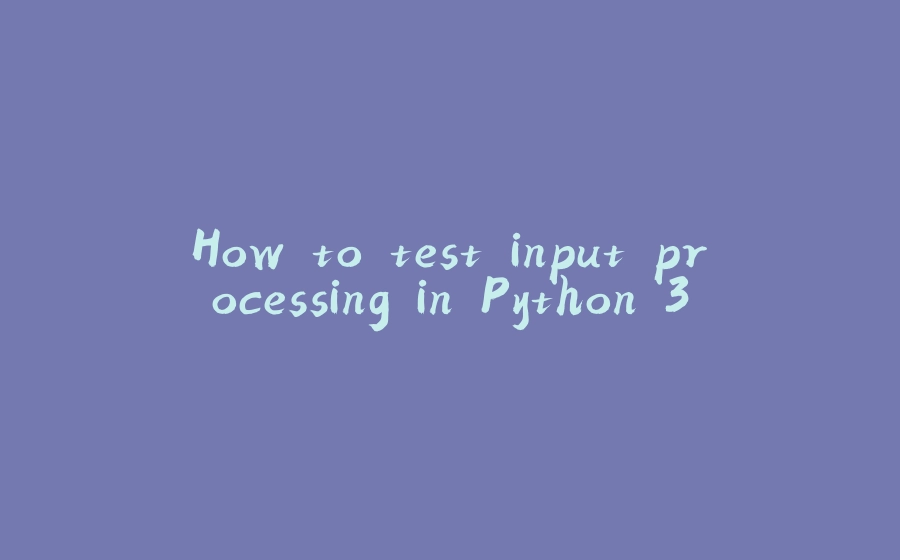Testing functions that use input() is not a straightforward task. This tutorial shows how to do that.
The problem
Contest programming problem solutions are usually tested automatically. So the input is just a set of strings with predefined format that fed into standard input.
Suppose, for example, a problem requires us to read in N stacks of different sizes. Then input might look like this:
3
4 1 2 3 2
1 2
0
Enter fullscreen mode Exit fullscreen mode
Here, 3 is the number of stacks to read in. The first number on each subsequent line is the size of the stack (which is not required in Python, but is helpful in other languages), followed by its elements.
To extract data from the input, a few manipulations have to be made:
def get_input_stacks():
n = int(input())
stacks = []
for _ in range(n):
str_stack = input().split(' ')
stack = [int(s) for s in str_stack]
stacks.append(stack)
return stacks
Enter fullscreen mode Exit fullscreen mode
And it doesn’t take a lot of effort to make a mistake here. In fact, I already made one in the code above. So, it would be nice to have automatic tests for this kind of functions too.
The solution
One of the solutions I found on StackOverflow when applied to my problem looks like this:
from unittest.mock import patch
import unittest
import containers
class ContainersTestCase(unittest.TestCase):
def test_get_input_stacks_processed_input_correctly(self):
user_input = [
'3',
'4 1 2 3 2',
'1 2',
'0',
]
expected_stacks = [
[1, 2, 3, 2],
[2],
[],
]
with patch('builtins.input', side_effect=user_input):
stacks = containers.get_input_stacks()
self.assertEqual(stacks, expected_stacks)
if __name__ == '__main__':
unittest.main()
Enter fullscreen mode Exit fullscreen mode
When I run the test, I see that it fails:
![图片[1]-How to test input processing in Python 3 - 拾光赋-拾光赋](https://media2.dev.to/dynamic/image/width=800%2Cheight=%2Cfit=scale-down%2Cgravity=auto%2Cformat=auto/https%3A%2F%2Fdev-to-uploads.s3.amazonaws.com%2Fuploads%2Farticles%2F423ihf6bar3cdewuzh8c.png)
The problem is that I read in the size of the stack as an element of the stack. Instead, I should just ignore it: str_stack = input().split(' ')[1:].
How the solution works
This is the most interesting line in the test:
with patch('builtins.input', side_effect=user_input):
Enter fullscreen mode Exit fullscreen mode
I assume it is known how with statement works. unittest.mock.patch has several keyword arguments that modify its behavior, but in this case, it simply replaces built-in input() function with a unittest.mock.MagicMock object. One of the properties of the object is to return its return_value unless its side_effect returns something else:
>>> import unittest.mock
>>> mock = unittest.mock.MagicMock()
>>> mock.return_value = '43'
>>> mock()
'43'
>>> def foo():
... return 'something_else'
...
>>> mock.side_effect = foo
>>> mock()
'something_else'
Enter fullscreen mode Exit fullscreen mode
Notice that side_effect, unlike return_value, is a function. side_effect can also be an exception object (then the exception will be raised when the mock is called) or an iterable. If it’s an iterable, the mock yields a new value every time it’s called:
>>> mock.side_effect = [1, 2]
>>> mock()
1
>>> mock()
2
>>> mock()
Traceback (most recent call last):
File "<stdin>", line 1, in <module>
File "/usr/local/Cellar/python3/3.6.1/Frameworks/Python.framework/Versions/3.6/lib/python3.6/unittest/mock.py", line 939, in __call__
return _mock_self._mock_call(*args, **kwargs)
File "/usr/local/Cellar/python3/3.6.1/Frameworks/Python.framework/Versions/3.6/lib/python3.6/unittest/mock.py", line 998, in _mock_call
result = next(effect)
StopIteration
>>>
Enter fullscreen mode Exit fullscreen mode
and this is what we are trying to achieve by mocking input(): a different predefined value each time it is called. This is why we are passing side_effect=user_input to the patch() function (side_effect is both a property of MagicMock and a keyword argument of patch()):
user_input = [
'3',
'4 1 2 3 2',
'1 2',
'0',
]
with patch('builtins.input', side_effect=user_input):
Enter fullscreen mode Exit fullscreen mode
The argument 'builtins.input' contains a name that points to the input() function. What patch() does is it basically makes this name point to the MagicMock object until the end of the with block. An object in Python can have multiple names, so patch the right one (here’s how). builtins is a module where built-in function names are located:
>>> import builtins
>>> builtins.print('hi')
hi
Enter fullscreen mode Exit fullscreen mode
Each time the function get_input_stacks() calls the patched input() it gets the next string in the user_input list. This is the behavior we wanted.
Where to go from here
To get a better understanding of the capabilities offered by unittest.mock, it is best to read the manual. As an exercise, I would suggest testing a function that does the reverse of get_input_stacks() by patching print().
Thank you for reading!


























暂无评论内容